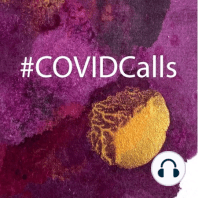59 min listen
EP #316 - 07.29.2021 - Air Quality & COVID-19, hosted by Kim Fortun and Katie Cox
FromCOVIDCalls
ratings:
Length:
66 minutes
Released:
Jul 29, 2021
Format:
Podcast episode
Description
Welcome to the 316h of the COVID Calls, a daily discussion of the COVID-19 pandemic with a diverse collection of disaster experts. My name is Kim Fortun, standing in for COVID Calls host Scott Gabriel Knowles, I am a cultural anthropologist who studies disaster and environmental health vulnerability. My co-host is Katie Cox, an anthropologist whose research examines how environmental injustice is characterized, focusing especially on use of community air monitoring. We’re both calling in from the Department of Anthropology, University of California Irvine, on the native lands of the Tongva and Acjachemen.
Priyanka deSouza graduated last spring from MIT’s Department of Urban Planning and is now an assistant professor in the Department of Urban and Regional Planning at the University of Denver. Her research examines different ways of understanding air pollution and its effects. Priynaka has worked with a diverse array of organizations, including community groups, Harvard School of Public Health, NASA and the World Health Organization. A recent publication examines PM 2.5 levels in Nairobi before and during the COVID-19 curfew, highlighting implications for environmental justice (https://iopscience.iop.org/article/10.1088/2515-7620/ac1214/meta).
Gaige Kerr is a research scientist in the Department of Environmental and Occupational Health at George Washington University. His research has examined chemical transport models and the meteorology responsible for ozone and particulate pollution. He’s also used satellite data to explore the inequalities of pollution distribution and exposure. An important goal is to understand the meteorological- and emissions-driven variability of surface-level air pollutants. A recent publication analyzes 15 largest metropolitan areas in the United States to see how the drop in air pollution during the COVID-19 pandemic differed from neighborhood to neighborhood.
(https://www.nasa.gov/feature/esnt/2021/qa-scientists-analyze-how-the-pandemic-affected-air-quality)
Priyanka deSouza graduated last spring from MIT’s Department of Urban Planning and is now an assistant professor in the Department of Urban and Regional Planning at the University of Denver. Her research examines different ways of understanding air pollution and its effects. Priynaka has worked with a diverse array of organizations, including community groups, Harvard School of Public Health, NASA and the World Health Organization. A recent publication examines PM 2.5 levels in Nairobi before and during the COVID-19 curfew, highlighting implications for environmental justice (https://iopscience.iop.org/article/10.1088/2515-7620/ac1214/meta).
Gaige Kerr is a research scientist in the Department of Environmental and Occupational Health at George Washington University. His research has examined chemical transport models and the meteorology responsible for ozone and particulate pollution. He’s also used satellite data to explore the inequalities of pollution distribution and exposure. An important goal is to understand the meteorological- and emissions-driven variability of surface-level air pollutants. A recent publication analyzes 15 largest metropolitan areas in the United States to see how the drop in air pollution during the COVID-19 pandemic differed from neighborhood to neighborhood.
(https://www.nasa.gov/feature/esnt/2021/qa-scientists-analyze-how-the-pandemic-affected-air-quality)
Released:
Jul 29, 2021
Format:
Podcast episode
Titles in the series (100)
#3 COVIDCalls 3.18.2020 - Evacuation & Shelter Decision-Making & Coping w/ Pets: What are the psychological factors behind how individuals and organizations make evacuation/sheltering decisions during disasters? How are pets a source of comfort and resilience? Dr. Sarah DeYoung, an expert on applied social and community psychology an... by COVIDCalls
